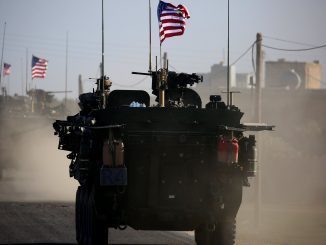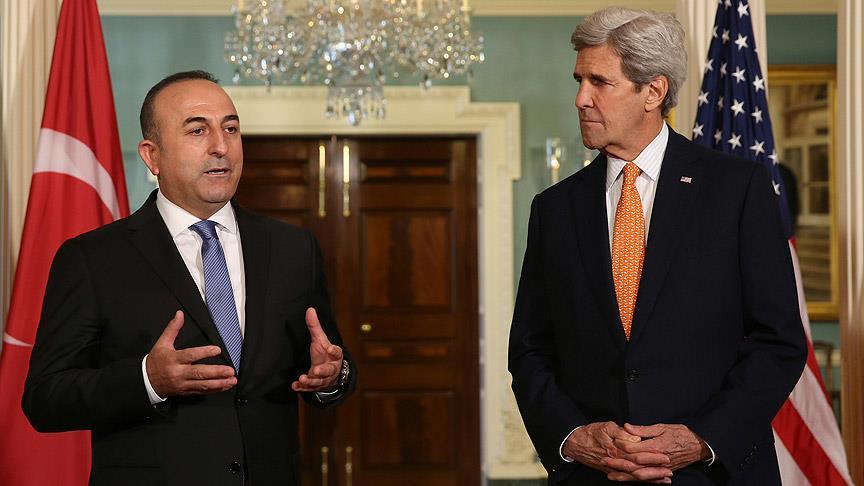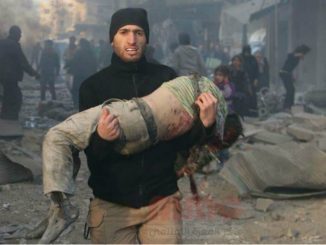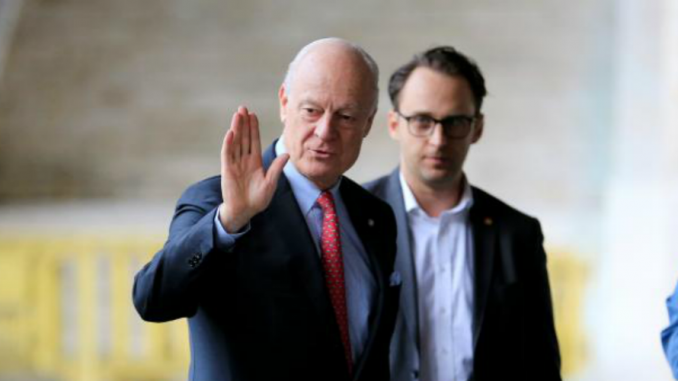
The UN special envoy for Syria met the opposition and regime’s delegations separately on Friday, handing them a working paper on procedural issues that may help in reaching a solution to end the crisis in Syria.
The new round of Syria peace talks has started in Geneva on February 23. after it was previously planned to be on February 8. but delayed in order to take advantage of the results of Astana settlement about the ceasefire in Syria, which was planned by Russia, Turkey, and Iran.
The UN special envoy for Syria, Staffan de Mistura, addressed the both delegations asking them to work together to help in ending the crisis in the country.
“I ask you to work together. I know it’s not going to be easy to end this horrible conflict and lay the foundation for a country at peace with itself, sovereign and unified,” de Mistura told the delegates sitting opposite each other on the stage of the U.N. assembly hall in Geneva.
De Mistura told the representatives of both delegations that they had a joint responsibility to end a conflict that had killed hundreds of thousands and displaced millions.
“The Syrian people desperately all want an end to this conflict and you all know it,” he said.
“You are the first ones to tell us it. They are waiting for a relief from their own suffering and dream of a new road out of this nightmare to a new and normal future in dignity.”
Working paper
De Mistura held bilateral meetings with the delegations on Friday to establish a plan for talks that could run into early March.
During the meetings, de Mistura called on all parties to respect each other and laid down his suggestions on the format of the current round of the talks. Some sources said that the paper may have a plan for a direct meeting between the both delegations.
“The provisions of the procedural paper suggest that “the parties respect each other and confidentiality and abstain from offenses,” a source said.
De Mistura also proposes the formula “nothing is agreed until everything is agreed” for the talks in his procedural paper, the source added.
“It is suggested to devote at least one day for discussion of the three main topics (governance, constitution, elections). It [the paper] allows parallel discussion of these issues and creation of the working groups.”
In a short statement to reporters after more than two hours of discussions with the U.N. envoy, the government’s chief negotiator Bashar al-Ja’afari said they had discussed only the format for the coming days.
“At the end of the meeting de Mistura gave us a paper and we agreed to study this paper. We shall inform him of our position,” he said.
He corrected an interpreter who described it as a “document” and gave no details of what it said. He took no questions.
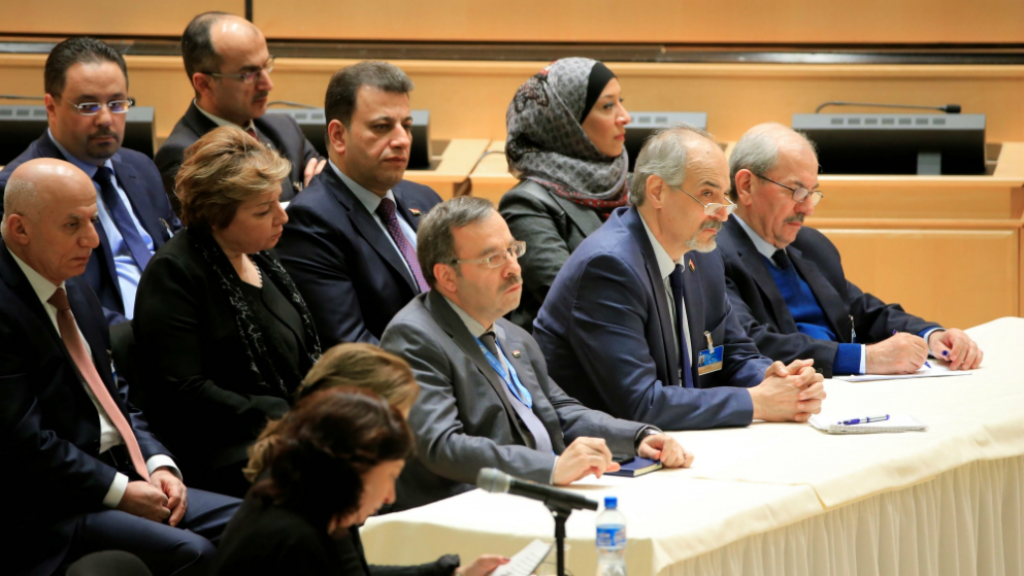
Opposition is optimistic
The opposition delegation, which is not fully under one umbrella, said it had also received the paper.
Friday’s discussions with de Mistura only covered “procedural” aspects of the ongoing talks, Hariri said, adding that specific points about the shape and scope of any transition would be clarified in the coming days.
“There is a paper about the procedural issues and some ideas to begin the political process,” lead negotiator Nasr al-Hariri told reporters.
“We have heard from Mr de Mistura positive ideas and suggestions, I believe he is more enthusiastic to be engaged seriously in political transition,” he said.
“I believe he was more enthusiastic than before in discussing a political transition in Syria. So far there are no specific measures.”
The opposition’s goal was to forge “a just political solution that ensures for the Syrian people its aspirations and dreams, for which it has paid a very high price”, he said.
Hariri said the opposition presented its “understanding” of points in UN Security Council Resolution 2254 that discuss political transition in Syria, including governance, the formation of a new constitution and new UN-supervised elections, suggesting it would not back down on its demands that Bashar al-Assad steps down from power.
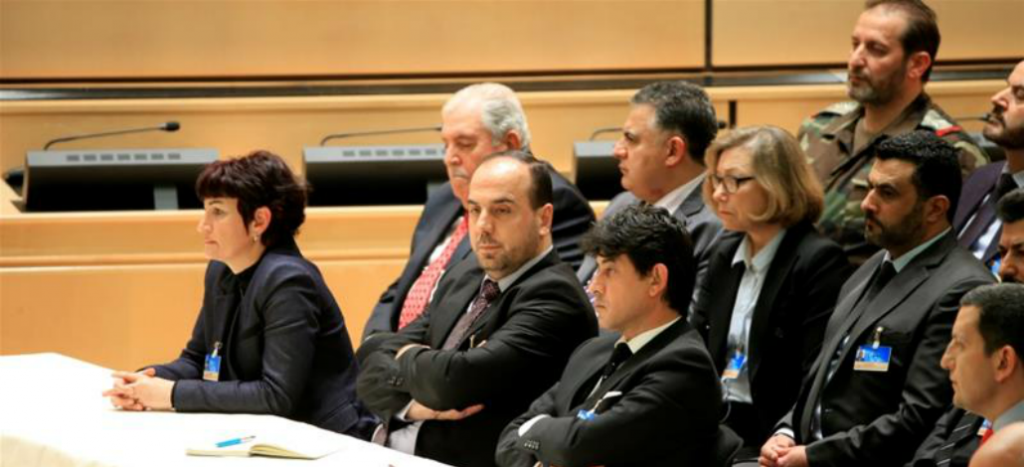
Opposition officials said that their delegation would respond on Monday to the framework for political transition submitted by de Mistura.
“What will be discussed in the following days is the make-up of a transitional governing body – as in, who the members of this body would be,” Mohammad Sabra, the chief negotiator for the opposition delegation, told Al Jazeera.
He said the opposition’s participation in the latest round of Geneva talks was aimed at finding ways to implement “mechanisms” to “force the Syrian government to comply with UN Security Council resolutions surrounding Syria if it refuses to do so”.
“The regime always claims that it is looking for a political solution,” Sabra said.
“So far, it has not said that it refuses to implement the resolutions. Resolution 2118 stipulates that in the case of refusal, the Security Council can take measures based on Chapter VII of the UN Charter […] to force the regime to comply with the international law so that we can achieve a political transition.”
Shortly after Friday’s news conference, the opposition delegation returned to its hotel and held a closed-door meeting with Michael Ratney, the US special envoy for Syria, and several European diplomats.
The Syrian crisis began as a peaceful demonstration against the injustice in Syria. Assad regime used to fire power and violence against the civilians and led to armed resistance. 450.000 Syrians lost their lives in the past five years according to UN estimates, and more than 12 million have lost their homes.

